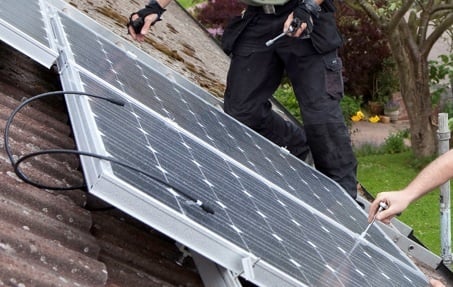A PROJECT to “retrofit” all 68 farmhouses across Devon County Council’s (DCC) extensive Farms Estate with energy efficiency measures is well under way.
And once complete, it will reduce carbon emissions emitted by the farmhouses by up to 70 per cent.
The Estate currently comprises of residential dairy and mixed livestock “starter” farms totalling 3,873 hectares, and they provide people with their first opportunity to farm.
So far, 35 of the farmhouses have been upgraded or “retro-fitted”, with a further eight currently undergoing work.
More than 40 per cent of Devon’s carbon emissions are caused by the buildings we live and work in.
Retrofitting is one of the main pillars of the Devon Carbon Plan, the county’s roadmap to net-zero by 2050 at the latest, to be published this summer.
The upgrades include double glazing, and cavity wall, loft, and floor insulation, which will wrap each farmhouse up like a tea cosy.
This will mean that each farmhouse will use a lot less energy in total than before for heating, hot water and appliances. It will also result in lower heating and energy bills for tenant farmers.
And, so far, 17 roof mounted solar arrays totalling 63 kWp in energy have been installed which will supply enough energy at a fixed weekly, affordable cost, again helping to reduce energy bills for tenants.
Additionally, the first air source heat pump on the Estate has been installed at Lower Pilehayes Farm as a trial to test their performance and efficiency in a rural environment.
Councillor Andrea Davis, DCC’s Cabinet Member for Climate Change, Environment and Transport, said: “Given that County Farms and our tenants have such a vital role to play in protecting the environment and in maintaining and enhancing Devon’s ecology whilst also providing wonderful food, it’s important that we also do what we can to reduce emissions from their homes.
“By ensuring that their farmhouses are more efficient it will reduce emissions, help each farmhouse maintain a more constant temperature and that will improve comfort and help keep energy costs down.”
Councillor Rufus Gilbert, Devon County Council’s Cabinet Member for Economic Recovery and Skills said: “It is no secret that the farming industry is under pressure and by investing in these farms we are investing in the future of Devon’s rural economy.
“These upgrades will make the lives of our tenant farmers easier by helping to keep their energy costs down and make it more likely that they will stay in the industry and then progress to perhaps their own farm. This will enable us to provide more opportunities for new entrants.”




